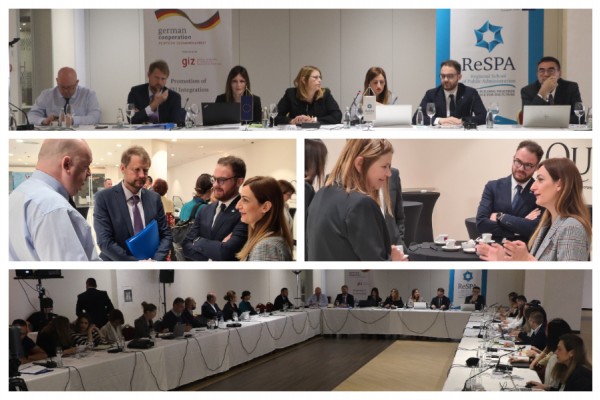
Regional Workshop on Window 3 of IPA III: Administrations highlight priorities for funding in the environment, transport, and energy sectors
5-6 May 2022
Mostar, BiH
ReSPA, in partnership with GIZ and DG NEAR (European Commission), gathered more than 80 participants (in-person and online) coming from the Western Balkans and Turkey administration from NIPAC Offices, CFCUs, NAO Support Offices and IPA Units in Ministries of Transport, Energy and Environment at the two-day Workshop dedicated to Window 3 of IPA III "Green Agenda and Sustainable Connectivity". It aimed to support a transition to climate neutrality and a healthy planet, focusing on reinforcing environmental protection, increasing resilience to climate change, accelerating the shift towards a low-carbon and circular economy and developing the digital economy.
Maja Handjiska-Trendafilova, ReSPA Director, opening the Workshop, emphasised that "actions/projects programmed and implemented under Window 3 will directly contribute to implementing the Economic and Investment Plan and the Green Agenda for the Western Balkans. These two important strategic documents should serve Western Balkans administrations as tools for developing actions that shall contribute to the Region's long-term recovery."
The Team Leader of the Programming Team in DG NEAR, Ms Ritva Heikkinen, informed us that "currently DG NEAR is developing a Programming Guidance for IPA III, to help the beneficiary administrations to plan and develop their proposals more comprehensively, predefining clear criteria and modalities". She also introduced the main novelties of the Instrument of Pre-accession Assistance, and essential elements were explained, such as the policy first approach (which replaces the sector approach), the performance-based approach, etc.
Representatives of the administrations had an exciting session with the Unit's Team Leader in charge of Connectivity, Climate and Environment in DG NEAR, Ms Alessandra Sgobbi. They discussed and brainstormed information related to programming actions under Window 3 for 2023. Ms Sgobbi emphasised that "the flagship initiatives and priorities of the Economic and Investment Plan for the Western Balkans and the Green Agenda for the Western Balkans should serve as the basis for inspiration to all administrations in the Region when proposing actions and investments for funding under IPA III Instrument".
She also briefly listed the top priorities which the administrations should address through EU Funded actions: circular economy, waste management, fighting and monitoring pollution, energy security (phasing out of coal and carbon-based industries), sustainable urban mobility and investments related to the TEN-T Network.
Representatives of the six administrations also presented their priority actions for funding during the upcoming years in the environment, transport, and energy sectors. The Team Leader of DG NEAR congratulated the administrations for the work done and strongly suggested consulting civil society and local authorities when developing actions and projects for funding.
During the session on ensuring the maturity of actions proposed to be financed under IPA III, Mr Mauro Di Veroli, Team Leader for IPA Planning in DG NEAR, emphasised that "a given effort to be funded should be relevant/realistic and mature (ready to start implementation)". Therefore, participants were introduced to how to check the strategic relevance of the proposed actions and their technical maturity.
Furthermore, DG NEAR colleagues from the IMBC Verifications Unit (Mr Philippe Hollinsky, Team Leader and Sandro Ciganovic, Auditor) presented the new management structures for the management of IPA III that the administrations need to establish for a smooth transition from IPA II to IPA III. They emphasised that the new institutional architecture for IPA III is good preparation for accession to the EU since IPA III structures are very similar to those existing in EU member states.
A specific session on developing indicators raised interest among attendees due to the challenges they have faced in this regard. Experts from the PROMEL project of DG NEAR explained different indicators and specific methodologies for using and measuring them. It was also informed that the IPA III Monitoring and Evaluation Framework would be published by the end of the year.
The last session of the Workshop focused on some tips on mainstreaming the so-called cross-cutting themes, mainly related to the green agenda. DG NEAR representatives highlighted that all actions to be financed under IPA III should explain if and how these actions tackle the cross-cutting themes.
The next Workshop on IPA III (Window 4), will be indicatively held in the last week of June in Belgrade, Serbia.



